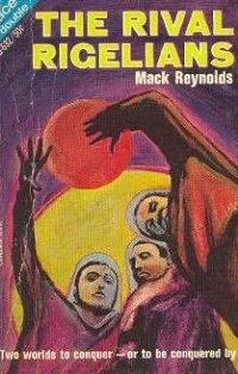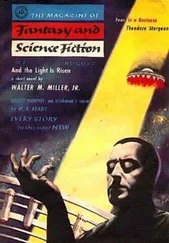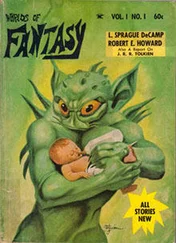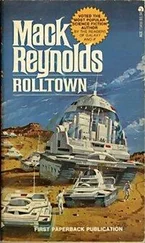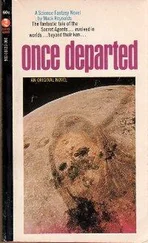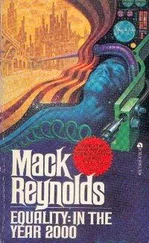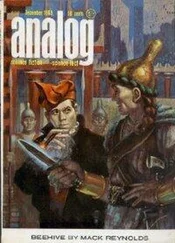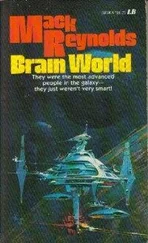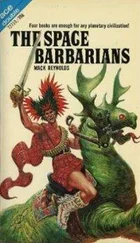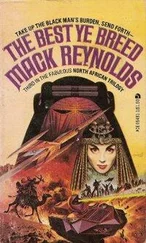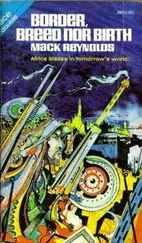Mack Reynolds - The Rival Rigelians
Здесь есть возможность читать онлайн «Mack Reynolds - The Rival Rigelians» весь текст электронной книги совершенно бесплатно (целиком полную версию без сокращений). В некоторых случаях можно слушать аудио, скачать через торрент в формате fb2 и присутствует краткое содержание. Год выпуска: 1967, Издательство: Ace Books, Жанр: Фантастика и фэнтези, на английском языке. Описание произведения, (предисловие) а так же отзывы посетителей доступны на портале библиотеки ЛибКат.
- Название:The Rival Rigelians
- Автор:
- Издательство:Ace Books
- Жанр:
- Год:1967
- ISBN:нет данных
- Рейтинг книги:4 / 5. Голосов: 1
-
Избранное:Добавить в избранное
- Отзывы:
-
Ваша оценка:
- 80
- 1
- 2
- 3
- 4
- 5
The Rival Rigelians: краткое содержание, описание и аннотация
Предлагаем к чтению аннотацию, описание, краткое содержание или предисловие (зависит от того, что написал сам автор книги «The Rival Rigelians»). Если вы не нашли необходимую информацию о книге — напишите в комментариях, мы постараемся отыскать её.
The Rival Rigelians — читать онлайн бесплатно полную книгу (весь текст) целиком
Ниже представлен текст книги, разбитый по страницам. Система сохранения места последней прочитанной страницы, позволяет с удобством читать онлайн бесплатно книгу «The Rival Rigelians», без необходимости каждый раз заново искать на чём Вы остановились. Поставьте закладку, и сможете в любой момент перейти на страницу, на которой закончили чтение.
Интервал:
Закладка:
Gunther cleared his throat smoothly. “So a man in Barry’s position will have as many as eight wives, eh? You must have lost a good many men.”
Watson grinned modestly. “Everybody doesn’t have that many. It’s according to your ability to support them, and, also rank has its privileges, as always. Besides, we figure it’s a good idea to spread the best seed around. By mixing our blood with the Texcocans we improve the breed.”
Behind him, Taller, the Tulan boy, stirred without notice. One of the two scientists looked at his colleague from the side of his eyes, but the faces of both remained expressionless.
Kennedy finished off his highball and began to build another, immediately. He said, “Here we go again. The big potatoes coming to the top.”
Watson flushed. “What do you mean by that, Kennedy?”
“Oh, come off it, Barry,” Kennedy laughed, “just because you’re in a position to push these people around doesn’t make you the prize stud on Texcoco.”
Watson elbowed Dick Hawkins to one side in his attempt to get around the table at the other.
Chessman rapped, “Watson! That’s enough. Knock it or I’ll have you under arrest.” The Texcocan team head turned abruptly to Mayer and Kennedy. “Let’s stop this nonsense. We’ve come to compare progress. Let’s begin.”
The three members of the Genoese team glared back in antagonism, but then Gunther said grudgingly, “He’s right. There is no longer amiability between us, so let’s forget it Perhaps when the fifty years are up, things will be different. Now let’s merely be businesslike.”
“Well,” Mayer said, “our report is that progress accelerates. Our industrial potential expands at a rate that surprises even us. In the near future, we’ll introduce the internal combustion engine. Our universities still multiply and are turning out technicians, engineers and scientists at an even quicker rate. In several nations, illiteracy is practically unknown and per capita production increases almost everywhere.” Mayer paused in satisfaction, as though awaiting the others to attempt to top his report.
Joe Chessman said sourly, “Ah, almost everywhere per capita production increases. Why almost ?”
Mayer snapped. “Obviously, in a system of free competition, all cannot progress at once. Some go under.”
“Whole nations?”
“Temporarily, whole nations can receive setbacks as a result of defeat in a war, or perhaps due to lack of natural resources. Some nations progress faster than others.”
Chessman said in dour satisfaction, “The whole Texcocan State is one great unit. Everywhere the gross product increases. Within the foreseeable future, the standard of living will be excellent.”
Jerry Kennedy, an alcoholic lisp in his voice now, said, “You mean you’ve accomplished the planet-wide government you were telling us about at the last meeting?”
“Well, no. Not as yet.” Chessman’s sullen voice had an element of chagrin in it. “However, there are no strong elements left that oppose us. We are now pacifying the more remote areas.”
“Sounds like a rather bloody program—especially if Barry Watson, here, winds up with eight women,” Martin Gunther said.
Watson started to retort to that, but Chessman held up a restraining hand. “The Texcocan State is too strong to be resisted, Gunther. It is mostly a matter of getting around to the more remote peoples. As soon as we bring in a new tribe, we convert it into a commune.”
“Commune!” Kennedy blurted.
Joe Chessman raised his thick eyebrows at the other. “The most efficient socio-economic unit at this stage of development. Tribal society is perfectly adapted to fit into such a plan. The principal differences between a tribe and a commune is that under the commune you have the advantage of a State above in a position to give you the benefit of mass industries, schools, medical assistance. In return, of course, for a certain amount of taxes, a military levy and so forth.”
Martin Gunther said softly, “I recall reading of the commune system as a student, but I fail to remember the supposed advantages.”
Chessman growled. “They’re obvious. You have a unit of tens of thousands of persons. Instead of living in individual houses, each with a man working while the woman cooks and takes care of the home and the children, all live in community houses and take their meals in a messhall. The children are cared for by trained nurses. During the season all able adults go out en masse to work the fields. When the harvest has been taken in, the farmer does not hole up for the winter but is occupied in local industrial projects, or in road or dam building. The commune’s labor is never idle.”
Kennedy shuddered involuntarily.
Chessman looked at him coldly. “It means quick progress. Meanwhile, we go through each commune and from earliest youth, locate those members who are suited to higher studies. We bring them into state schools where they get as much education as they can assimilate—more than is available in commune schools. These are the Texcocans we are training in the sciences.”
“The march to the anthill,” Amschel Mayer muttered.
Chessman eyed him scornfully. “You amuse me, old man. You with your talk of building an economy with a system of free competition. Our Texcocans are sacrificing today but their children will live in abundance. Even today, nobody starves, no one goes without shelter or medical care.” Chessman twisted his mouth. “We have found that hungry, cold or sick people cannot work efficiently.”
He stared challengingly at the Genoese leader. “Can you honestly say the same? That there are no starving people in Genoa? No inadequately housed, no sick without hope of medicine? Do you have economic setbacks in which poorly planned production goes amuck and depressions follow with mass unemployment?”
“Nevertheless,” Mayer said, with unwonted calm, “our society is still far ahead of yours. A mere handful of your bureaucratic and military chiefs enjoy the good things of life. There are tens of thousands on Genoa who have them. Free competition has its weaknesses, perhaps, but it provides a greater good for a greater number of persons.”
Joe Chessman came to his feet. “Well see,” he said stolidly. “In ten years, Mayer, we’ll consider the positions of both our planets once again.”
“Ten years it is,” Mayer snapped back at him.
Jerry Kennedy saluted with his glass. “Cheers,” he said.
On the return to Genoa, Amschel Mayer looked his disgust at his right hand man. Kennedy was not piloting the small craft, as usual. Martin Gunther was at the controls.
Mayer said, “Are you sober enough to assimilate something serious?”
Jerry Kennedy shook his head to achieve clarity. “Sure, chief, of course. That Earthside liquor is just a little stronger than what I’m used to these days, I guess. Sneaks up on you.”
Mayer grunted contempt but said, “Well then, begin taking the steps necessary for us to place a few men on Texcoco in the way of, ah, intelligence agents.”
“You mean some of our team?” Kennedy said, startled.
Gunther looked over from the space launch’s controls and raised his eyebrows.
Mayer said impatiently, “No, no of course not. We can’t spare them, and, besides, there’d be too big a chance of recognition and exposure. We’ll have to use some of our more trusted Genoese. Make the reward enough to attract their services.” He looked from one of his lieutenants to the other significantly. “I think you’ll agree that it might not be a bad idea to keep our eyes on the developments on Texcoco.”
Martin Gunther thought about it. “Well, perhaps, but there’s another aspect, Amschel. Thus far, we’ve kept the secret of the Pedagogue’s existence from anybody we come in contact with on Genoa. Not even such close business associates as Mannerheim have been told about the real nature of our mission.”
Читать дальшеИнтервал:
Закладка:
Похожие книги на «The Rival Rigelians»
Представляем Вашему вниманию похожие книги на «The Rival Rigelians» списком для выбора. Мы отобрали схожую по названию и смыслу литературу в надежде предоставить читателям больше вариантов отыскать новые, интересные, ещё непрочитанные произведения.
Обсуждение, отзывы о книге «The Rival Rigelians» и просто собственные мнения читателей. Оставьте ваши комментарии, напишите, что Вы думаете о произведении, его смысле или главных героях. Укажите что конкретно понравилось, а что нет, и почему Вы так считаете.
